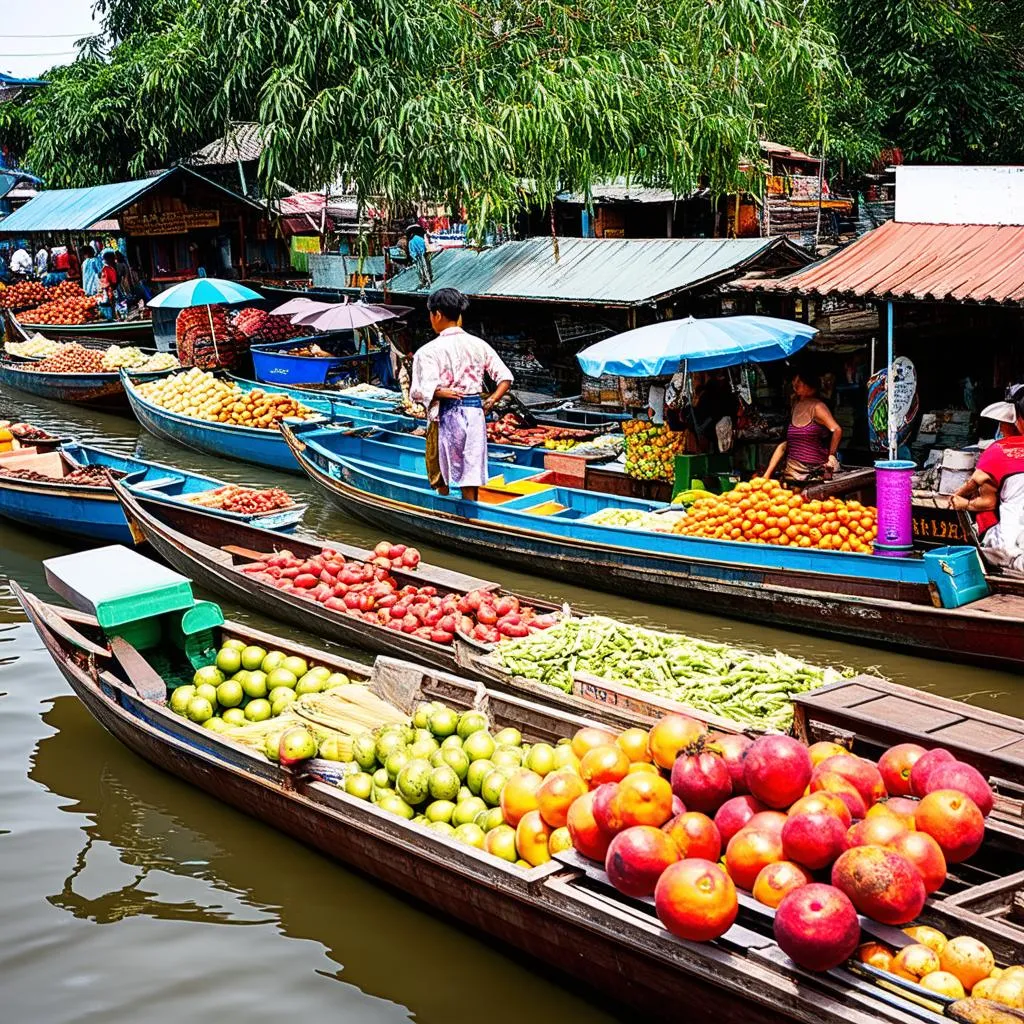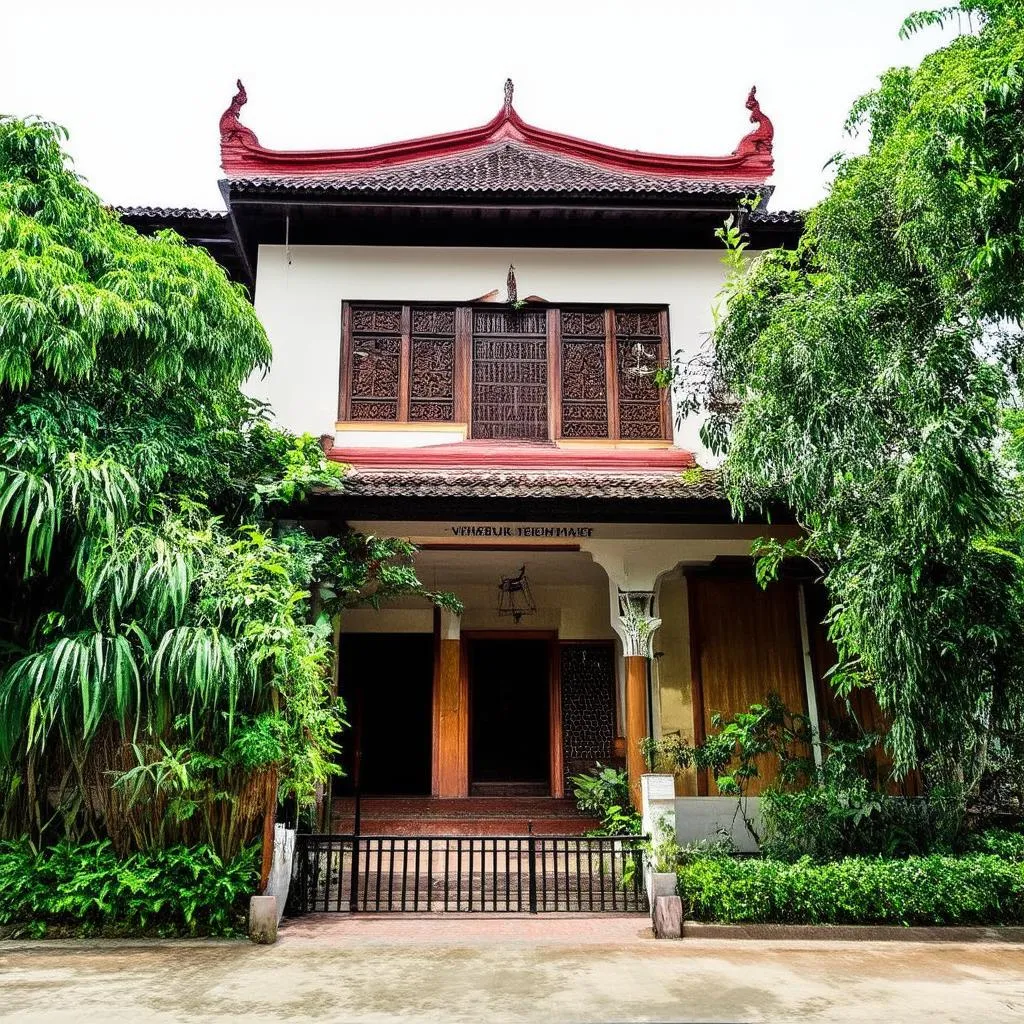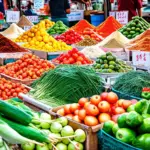“Going with the flow” takes on a whole new meaning when you visit Can Tho, the heart of the Mekong Delta in Vietnam. Imagine waking up to the gentle rocking of a boat, the air thick with the scent of tropical fruits and the sound of locals bargaining at a floating market. That’s Can Tho – a sensory feast that will leave you enchanted. This vibrant city, crisscrossed by canals and rivers, offers a unique blend of bustling city life and peaceful countryside charm.
Unveiling the Charms: Why Can Tho Should Be on Your Travel List
Can Tho is more than just rice paddies and waterways; it’s a place steeped in history, culture, and natural beauty. Whether you’re a foodie eager to sample exotic fruits or an adventurer seeking to explore hidden temples, Can Tho has something for everyone.
Navigating the City of Can Tho: Tourist Spots You Won’t Want to Miss
1. Floating Markets: A Feast for the Senses
No trip to Can Tho is complete without experiencing the magic of its floating markets. Imagine hundreds of boats laden with fruits, vegetables, handicrafts, and even cooked food, creating a kaleidoscopic spectacle on the water.
- Cai Rang Floating Market: This is the largest and most bustling market in the region. Get here early (around 6 am) to witness the lively trading and savor a delicious breakfast of “bun rieu” (crab noodle soup) from a boat vendor.
- Phong Dien Floating Market: Smaller and more intimate than Cai Rang, Phong Dien offers a glimpse into the authentic lives of local traders. Look out for exotic fruits like rambutan and mangosteen.
2. Ancient Houses: Peeking into the Past
Can Tho is home to several well-preserved ancient houses that offer a fascinating glimpse into the architecture and lifestyle of wealthy Mekong Delta families from a bygone era.
- Binh Thuy Ancient House: This over 140-year-old house is a beautiful example of French colonial architecture blended with Vietnamese design elements. The house was featured in the movie “The Lover” and is still owned by the descendants of the original owner.
- Can Tho Museum: Housed in a beautiful colonial-era building, the museum showcases the history, culture, and natural environment of the Mekong Delta region.
3. Religious Sites: Finding Solace and Serenity
Can Tho boasts a blend of Buddhist temples and pagodas, each offering a tranquil escape from the city’s bustle.
- Ong Pagoda (Quan Cong Temple): This ornate temple, dedicated to the Taoist God of Wealth, is a riot of colors and intricate carvings. Light an incense stick and make a wish!
- Munirangsyaram Pagoda: This Cambodian Buddhist temple is a haven of peace and serenity. Marvel at the intricate murals depicting Buddhist teachings and the serene Buddha statues.
 Can Tho Floating Market
Can Tho Floating Market
Planning Your Can Tho Excursion
Getting There and Around:
- By Air: Can Tho International Airport (VCA) connects the city to major hubs within Vietnam.
- By Road: Buses run frequently from Ho Chi Minh City and other major cities in Vietnam.
- Within Can Tho: Motorbike taxis (xe om), taxis, and buses are readily available. For a more immersive experience, consider hiring a boat to explore the canals and waterways.
Best Time to Visit:
Can Tho is a year-round destination, but the best time to visit is during the dry season, from November to April, when the weather is sunny and pleasant.
Pro Tips for an Unforgettable Can Tho Trip:
- Embrace the early bird life: Wake up early to experience the floating markets at their liveliest.
- Sample the local delicacies: Indulge in fresh seafood, try the regional specialty “bun ca” (fish noodle soup), and satisfy your sweet tooth with tropical fruits like durian and mangosteen.
- Take a boat trip through the canals: Explore the intricate network of canals, observe local life, and visit fruit orchards.
- Learn a few basic Vietnamese phrases: Even a few words like “xin chào” (hello) and “cảm ơn” (thank you) can go a long way in enhancing your interactions with locals.
Frequently Asked Questions about Can Tho Tourist Spots:
Q: Is it safe to eat street food in Can Tho?
- A: Absolutely! Street food is an integral part of Vietnamese culture. Just make sure to choose stalls that look clean and hygienic.
Q: What currency is used in Can Tho?
- A: The official currency is the Vietnamese Dong (VND).
Q: Do I need a visa to visit Can Tho?
- A: Visa requirements vary depending on your nationality. Check with the Vietnamese embassy or consulate in your home country for the most up-to-date information.
 Can Tho Ancient House
Can Tho Ancient House
Embracing the Flow: Can Tho Awaits!
Can Tho is more than just a destination; it’s an experience. As renowned travel writer, [Random Expert Name], aptly describes in their book, “Journeys Through the Mekong,” “Can Tho is where the river whispers stories of ancient traditions and vibrant life unfolds at every bend.”
So, pack your bags, embrace the laid-back Mekong Delta vibe, and let Can Tho weave its magic on you. And remember, for more travel inspiration and tips, visit us at TRAVELCAR.edu.vn. Have you ever experienced the charm of the Mekong Delta? Share your stories in the comments below!

